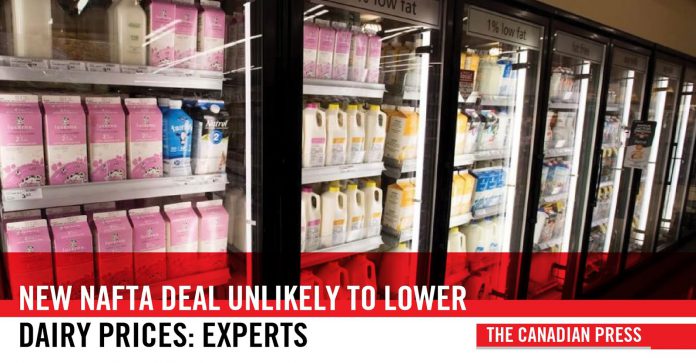Table of Content
Though prices under the trilateral agreement may remain unchanged, consumers will likely have more choice in the dairy case
Canadians hoping their weekly grocery staples like milk and eggs may soon cost fewer. This is thanks to a new trade deal that opens up Canada’s dairy industry may be out of luck. Experts say the trilateral agreement between Canada, the U.S., and Mexico is unlikely to bring prices down. However, could leave shoppers with more choices in the dairy aisle.
The U.S.-Mexico-Canada Agreement announced Sunday night will grant an expanded 3.6% market access. This access is to the domestic dairy market and eliminates two milk price classes. Also, including the controversial Class 7.
U.S. President Donald Trump had long criticized Canada’s supply management system for undercutting American exports and hurting U.S. farmers.
IMPLEMENTATION OF THE SUPPLY CHAIN MANAGEMENT IN THE DAIRY INDUSTRY
Canada implemented supply management in the dairy industry in the 1970s, which set quotas on production based on anticipated demand. The government also decides how much blocks out foreign production with high tariffs. In the form of an amount paid to them for the production made by the farmers. This is apart from the government’s key decision-making for the farmers.
Prior to the new deal. The Experts said Trump did not necessarily want to dismantle supply management. However, rather was more angered by milk classifications like Class 7. The elimination shall take place under the new agreement signed.
“I don’t see a big, immediate impact on retail pricing,” said Al Mussell. He is the founder of Agri-Good Economic Systems Inc. This is an agriculture and food research organization.
The standard four-liter bag of milk is a loss leader for most grocers. Sold below the price needed just in order to attain profits, he said. On the promotion is cheese and butter at any given time, he said.
“Nothing changes there.”
The Class 7 milk ultra-filtered is a protein-heavy concentrate. However, Class 7 milk ultra-filtered is under the new deal’s elimination. It is used to make cheese and other dairy products, is the biggest news item, said Sylvain Charlebois. He is a Dalhousie University professor who is the lead author on an annual food price report. The report estimated how much grocery and restaurant prices will rise or fall over the coming year.
In 2016, Canada created the Class 7 pricing agreement that has essentially restricted U.S. exports of the product. It allows Canadian dairy processors to buy domestic milk at cheaper world market prices instead of higher prices controlled by the national supply management system.
THE CLASS ELIMINATION
Eliminating that class would allow processors to become more competitive and potentially give grocers room to bring down prices, Charlebois said.
“It doesn’t necessarily mean that consumers will reap the rewards or that the sector will pass on savings to consumers,” he said.
If cheaper products than what’s available in Canada come in on the wholesale market, said Mussell, grocers will just eat less of a loss on their dairy promotions or loss leaders.
The Dairy Farmers of Canada, which released a statement from its president saying the deal “will have a dramatic impact” on the sector and farmers, can’t answer if there will be any changes to consumer prices, wrote spokeswoman Lucie Boileau in an email.
“We’re still analyzing the agreement.”
The Canadian Dairy Commission did not respond to a request for comment about how the new deal may impact consumer prices. The commission sets support prices for butter and skims milk powder, which provinces use as a reference to establish provincial prices for industrial milk.
The one positive for consumers–at least those in bigger markets such as Toronto or Vancouver–may be more choice in the dairy aisles, said Mike von Massow, an associate professor at the University of Guelph. He adds there won’t be a substantial change in retail prices.
Von Massow points to the cheese aisle as an example of increasing variety. Growth has been small, he said, but there’s a broader range of products now than 15 years ago.
Since Canada entered the Comprehensive Economic Trade Agreement, or CETA, with the European Union and allowed more European cheese to be imported into the country, he said, there’s been growth in varieties available.
“We’re seeing a wider variety of cheeses than we’ve ever seen before rather than the bottom falling out of the cheese market.”


